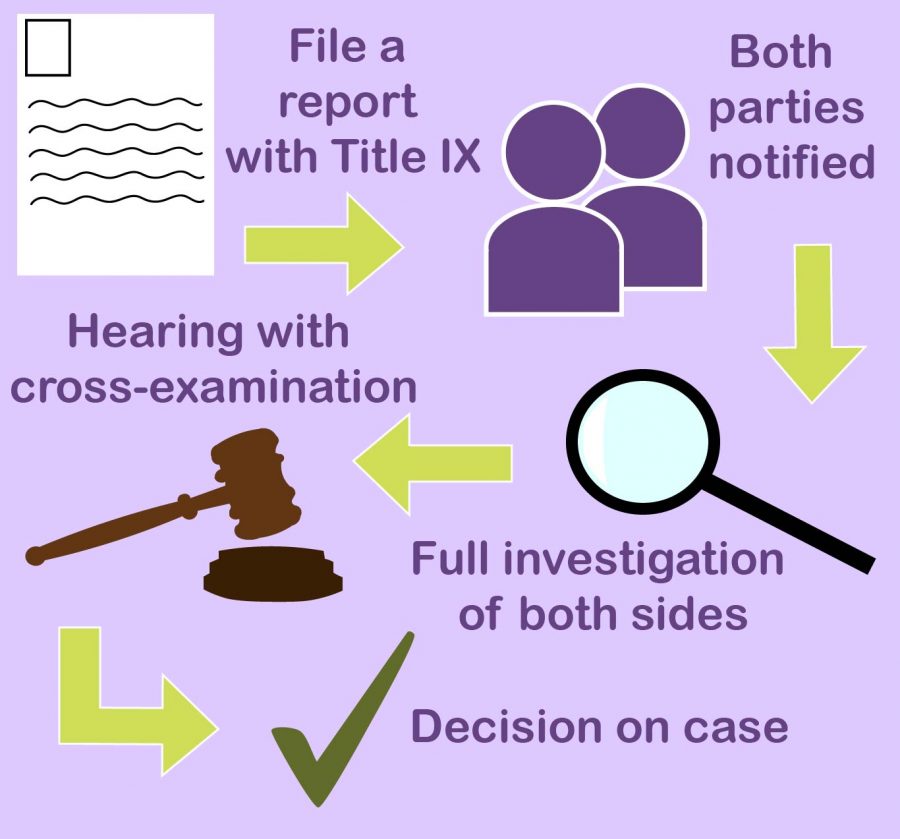New federal regulations change Chatham Title IX policies
The process one goes through after reporting an incident to Title IX under the new federal regulations. Credit: Alexis Taranto
September 16, 2020
Federal changes made by the U.S. Department of Education to Title IX regulations are being implemented at Chatham University this semester.
The new regulations, known as the “Final Rule,” offer procedural changes and increased protections of all parties involved in sexual harassment investigations. Chatham began operating under these new policies Aug. 14, as required by the Department of Education.
The regulations change the definition of the umbrella term “sexual harassment” used in the Title IX policies. Sexual harassment is described in three ways by the Final Rule:
- “Quid Pro Quo” — An employee of a school conditioning the provision of an aid, benefit or service of the school on an individual’s participation in unwelcome sexual conduct; or
- Unwelcome conduct determined by a reasonable person to be so severe, pervasive and objectively offensive that it effectively denies a person equal access to the school’s education program or activity; or
- Sexual Assault, Dating Violence, Domestic Violence or Stalking (as defined in the Policy).
Chatham Title IX coordinator Sean Coleman said the changes to the second definition of sexual harassment (listed above) are, “one of the first differences if you look at our policy this year.”
This definition of sexual harassment is narrower than what was used by Chatham and many other schools prior to the Final Rule. Under former Title IX policies, acts of sexual misconduct were referred to as “prohibited acts.”
These descriptions of sexual harassment limit Title IX’s jurisdiction to reports that fall directly into one of these more limited definitions.
Chatham is now required, by the regulations, to hold hearings regarding alleged sexual harassment. Prior to the new policies, Chatham used a two-investigator model to conduct investigations. Under the changes, there is now one investigator and one “decision maker.” The decision maker presides over the hearing and determines sanctions if necessary to the specific case.
During the hearings, both parties, the complainant and respondent, are subject to cross examination by an adviser. This adviser could be appointed by the University, or hired by the respective party. Advisers are responsible for asking questions provided by the party they are representing. This is done so there is no direct contact between the respondent and complainant during the hearing.
Critics of the Final Rule assert that its new regulations may make a complainant apprehensive to disclose an incident of sexual harassment to Title IX.
“There is something to be said about live hearings, that they are particularly traumatic for victims because survivors often suffer from PTSD,” said Blue Strickland, a Chatham student and sexual health advocate Blue Strickland.
Coordinator Coleman said he understands how a hearing could be daunting. He hopes that the new Title IX regulations “don’t inhibit or discourage anyone at Chatham from reporting that they’ve experienced sexual harassment, including sexual assault. Because if Chatham doesn’t know that a person has been sexually harassed, we can’t help that person, can’t help stop the sexual harassment and can’t help stop the harassment from happening again.
“The new regs leave the choice of pursuing a formal complaint, which initiates an investigation and a hearing … in almost every circumstance … [but] a complainant can still report sexual harassment and receive supportive measures even if they don’t choose or chose to file a formal complaint.”
Anyone who wishes to report an incident of sexual harassment can contact the Chatham Title IX office for resources and aid. The Chatham Title IX office is located on the second floor of Mellon Center, and personnel can be reached via phone or email, all of which are listed on the Chatham Title IX website.







